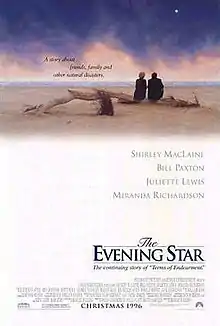The Evening Star
The Evening Star is a 1996 American comedy-drama film. It is a sequel to the Academy Award-winning 1983 film Terms of Endearment starring Shirley MacLaine, who reprises the role of Aurora Greenway, for which she won an Oscar in the original film. Based on the novel by Larry McMurtry, the screenplay is by Robert Harling, who also served as director.
| The Evening Star | |
|---|---|
 Theatrical release poster | |
| Directed by | Robert Harling |
| Produced by | David Kirkpatrick Polly Platt Keith Samples |
| Screenplay by | Robert Harling |
| Based on | The Evening Star by Larry McMurtry |
| Starring | |
| Music by | William Ross |
| Cinematography | Don Burgess |
| Edited by | David Moritz |
Production company | |
| Distributed by | Paramount Pictures |
Release date |
|
Running time | 129 minutes |
| Country | United States |
| Language | English |
| Budget | $20 million |
| Box office | $12,767,815 |
The story takes place about fifteen years after the original, following the characters from 1978 to 1993. It focuses on Aurora's relationship with her three grandchildren, her late daughter Emma's best friend Patsy and her longtime housekeeper Rosie. Along the way Aurora enters into a relationship with a younger man, while watching the world around her change as old friends pass on and her grandchildren make lives of their own.
Miranda Richardson co-stars as a Houston divorcee and Aurora's rival, Patsy Carpenter. Juliette Lewis plays Aurora's rebellious granddaughter, Melanie Horton, with Marion Ross as Aurora's housekeeper (Golden Globe nominated in the Best Supporting Actress category) and Bill Paxton as Aurora's psychiatrist and lover. The movie was Ben Johnson's last, in a career that spanned over 60 years. The film is dedicated to him. Jack Nicholson returns in an extended cameo appearance, playing the role he played in Terms of Endearment, retired astronaut Garrett Breedlove.
Unlike its predecessor, The Evening Star received negative reviews from critics and was a box office bomb.
Plot
Years have passed since the death of her daughter, Emma. Aurora Greenway is still her usual strong, willful self, but all is not well with the three grandchildren she raised after Emma's death, particularly eldest boy Tommy, who is serving time in jail on a drug charge.
Younger grandson Teddy now has a girlfriend and a son. Melanie (who is both the youngest and the only girl out of the three grandkids), is all but grown and still living with Aurora at home but giving serious thought to moving out. Aurora's only true companion is housekeeper Rosie, particularly now that a man she's been spending time with, the General, is a friend, not a romance.
Her late daughter's old friend, Patsy, still has a home in Houston and thinks of herself as Aurora's friend now, dispensing advice to Melanie, something that Aurora does not appreciate.
Rosie is being courted by an elderly gentleman named Arthur, who has bought astronaut Garrett Breedlove's former house next door. On seeing how lonely Aurora obviously is, Rosie tricks her into seeing a licensed counselor, Jerry, to whom Aurora admits that she is still seeking "the love of my life."
Thoroughly unprofessional in almost every way, Jerry jumps into a romantic situation with Aurora himself. However, he has an ulterior motive, which she soon learns.
Needing a cause, Aurora decides to take charge after Melanie moves to California to try to become an actress. She is peeved to discover that Patsy has exactly the same idea. Melanie succeeds in landing a role on a television show. Aurora comes home to a new problem, however, when it turns out that Rosie is critically ill. She is left once more facing the prospect of being alone. Aurora is cheered up only by a brief visit from Garrett, who advises her to find that true love soon because "there aren't that many shopping days left till Christmas."
Cast
- Shirley MacLaine as Aurora Greenway
- Bill Paxton as Jerry Bruckner
- Juliette Lewis as Melanie Horton
- Miranda Richardson as Patsy Carpenter
- Ben Johnson as Arthur Cotton
- Scott Wolf as Bruce Burgess
- George Newbern as Tommy Horton
- Marion Ross as Rosie Dunlop
- Mackenzie Astin as Teddy Horton
- Donald Moffat as Hector Scott
- Jack Nicholson as Garrett Breedlove
- China Kantner as Jane
- Jennifer Grant as Ellen
- Jake Langerud as Henry
Reception
Unlike Terms of Endearment, the film was not a box-office success, grossing only $12,767,815 (unadjusted) and received poor reviews from critics. It holds a 22% rating on Rotten Tomatoes from 27 reviews.[1]
Roger Ebert, in his Chicago Sun-Times review of December 27, 1996, described The Evening Star as "a completely unconvincing sequel", awarding it one-and-a-half stars of a possible four. He said the story lacks any points of interest, and found the character developments contrived and clunky.[2] Mick LaSalle, in a December 25 San Francisco Chronicle review, similarly said that the film lacks a story and instead "is constructed as a series of incidents involving Aurora and her family." He praised Shirley MacLaine's performance but derided the characterizations and overall tedium of the film, summing it up as "one of the worst films of the year".[3] Ebert and LaSalle both criticized the numerous character deaths, interpreting them as a desperate attempt to maintain the viewer's interest.[2][3]
External links
References
- "The Evening Star (1996)". Rotten Tomatoes. Retrieved 22 January 2021.
- Ebert, Roger (December 27, 1996). "The Evening Star Movie Review (1996)". RogerEbert.com. Ebert Digital LLC. Retrieved September 24, 2017.
- LaSalle, Mick (December 25, 1996). "MacLaine Can't Save 'Evening'". SFGate. Retrieved 22 January 2021.